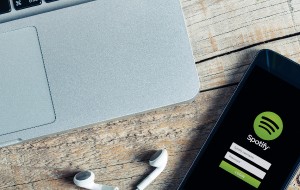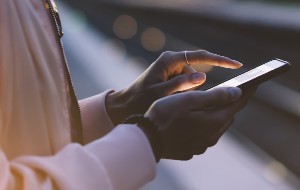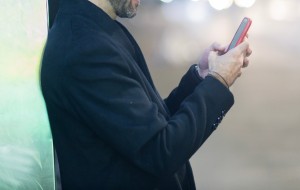Table of contents
- Is FaceTime secure?
- What security features does FaceTime have?
- How FaceTime can be tapped
- How to know if your FaceTime is being tapped
- 1. See if there are any unknown or suspicious apps on your phone
- 2. Check for signs of jailbreaking your device
- 3. Scan your phone with a third-party anti-spyware app
- How to make FaceTime safer
- 1. Beware of suspicious calls
- 2. Make sure only trusted people use your phone
- 3. Always use a secure and private internet connection when making calls
- 4. Be sure to enable two-step verification for your account
- 5. Use strong passwords
- 6. Keep your OS up to date
- 7. Manage app permissions
- 8. Use anti-spy app
- What are the legal implications of FaceTime tapping?
- Conclusion
- FAQ about FaceTime tapping
- 1. Are FaceTime calls recorded?
- 2. Is FaceTime encrypted?
- 3. Can FaceTime calls be traced by police?
- 4. Is FaceTime safe for couples?
- 5. How to know if your FaceTime is hacked
Is FaceTime secure?
FaceTime, like iMessage, is end-to-end encrypted to protect your calls from potential hackers, and many people wonder whether FaceTime can be tapped. It means that no one except you and the person you’re communicating with can intercept and listen in on your calls. Not even Apple can decrypt data to monitor conversations.
However, it’s important to note that whenever you jailbreak your iPhone, you compromise the security built into iOS and give applications access to parts of the system that they shouldn’t see. This is when FaceTime tapping is most likely to occur.
What security features does FaceTime have?
End-to-end encryption is FaceTime's primary security feature. It prevents third parties, including Apple, from seeing the audio and video of your calls when they’re sent between devices.
So, even if a hacker intercepted FaceTime data between two devices, they couldn’t decrypt it to reveal the contents of your call. Even the most sophisticated tools used by the government and the FBI cannot decipher encrypted calls.
Apple doesn’t store the content of your FaceTime calls, but the company says it may store information about your use of its services. This might include who you invite to your call and your device’s network configuration, and Apple holds the information for up to 30 days.
If you’re particularly concerned about your privacy, this may be a concern, but it’s worth noting that Apple doesn’t store this information in a way that might identify you. There are no links between the data and you as a person, and Apple doesn’t track whether recipients answer a FaceTime call.
How FaceTime can be tapped
The primary way in which FaceTime can be intercepted or tapped is with spyware that secretly records calls in the background. The spyware then sends the recordings to whoever might be spying on you, and this is usually the same person who installed the spyware on your iPhone or iPad to begin with.
In most cases, spyware that can tap FaceTime calls requires a jailbreak. That’s because the software needs to circumvent Apple’s built-in protections, which only a jailbreak allows. The software isn’t available from the App Store, so it must be “sideloaded” from a third-party source.
However, spyware and other malware have appeared on the App Store. It’s not a common occurrence because Apple usually catches these attacks during the approval process and blocks them, but some have slipped through its net, which is why it’s important to be vigilant.
How to know if your FaceTime is being tapped
You might be wondering how to tell if your phone is tapped or how you can find out if someone is listening to your FaceTime calls. Well, there are some things you can do to check, such as:
- See if there are any unknown or suspicious apps on your phone
- Check for signs of jailbreaking your device
- Scan your phone with a third-party anti-spyware
1. See if there are any unknown or suspicious apps on your phone
Check the App Library on your iPhone and iPad to see if you have any suspicious or unrecognized apps installed. Be sure to remove anything you didn’t install from the App Store. Bear in mind that spyware and other malicious apps usually try to hide themselves by using innocent names and icons.
2. Check for signs of jailbreaking your device
Spyware often makes its way onto Apple devices through a jailbreak. See if your device has been jailbroken by looking for unauthorized package managers like Cydia and Sileo in your App Library. If you find one of these and you didn’t jailbreak your iPhone yourself, it’s a cause for concern.
3. Scan your phone with a third-party anti-spyware app
The best way to find malicious apps that can tap into your FaceTime calls is by running a spyware scan on your iPhone or iPad. Manual checks are useful, but advanced spyware or stalkerware is designed to hide deep in the system. This is where Clario Anti Spy helps.
Simply follow these steps:
- Download Clario Anti Spy and create an account.
- On the home screen, look for Anti-spy setup. Press Set up when you find it.
- You’ll now see a list of actions you can take to make your device less vulnerable. Go through each action step-by-step until you’ve completed the process and secured your phone.
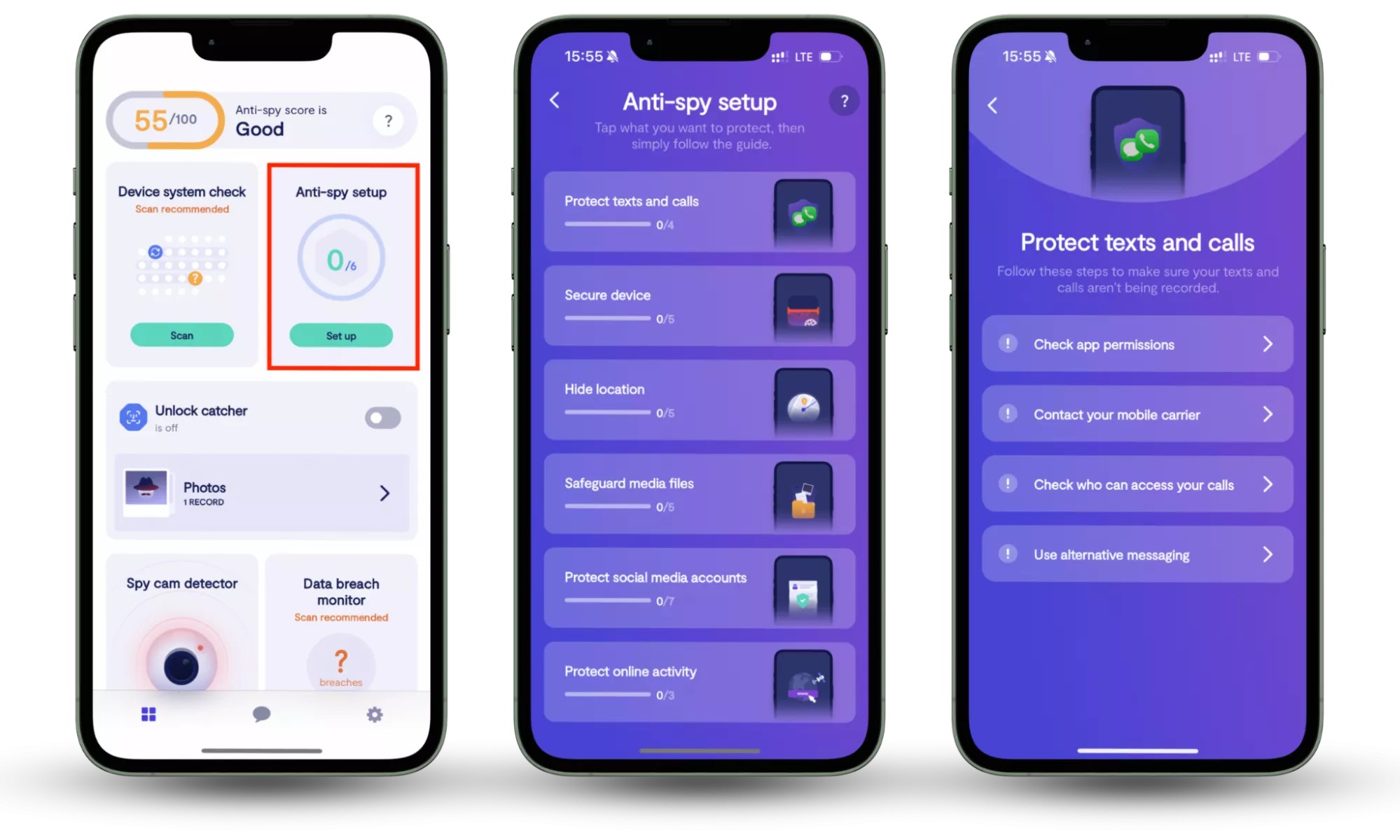
How to make FaceTime safer
If you’re keen to learn how to secure your iPhone from hackers or how to make FaceTime safer, you’ll be pleased to find it’s not that difficult. Make sure you’re running the latest version of iOS or iPadOS with the most recent security patches, and follow good cybersecurity practices.
You can also try these tricks to avoid common spyware scams:
- Beware of suspicious calls
- Make sure only trusted people use your phone
- Always use a secure and private internet connection when making calls
- Be sure to enable two-step verification for your account
- Use strong passwords
- Keep your OS up to date
- Manage app permissions
- Use anti-spy app
1. Beware of suspicious calls
Anyone can call you and record the conversation, so to avoid this, be sure to only answer calls from people you recognize. If you get an important call from an unknown number, they should leave you a voicemail, and then you can call them back later.
If you’re wondering how to know if someone is listening to your calls, listen out for signs of another person on the line during your conversations. Ask the person you’re speaking with to mute their microphone and see if you can hear any strange sounds, which could suggest a third person is also listening in.
2. Make sure only trusted people use your phone
Someone who wants to install spyware on your device needs access to it, so you can easily avoid this risk by not allowing anyone to use your phone, especially if you don’t know them very well. You might choose to bend this rule for someone you trust, but even then, you should keep an eye on your device.
3. Always use a secure and private internet connection when making calls
A common trick attackers use to intercept someone’s internet traffic is to exploit public Wi-Fi networks, which are usually insecure. Only use secure and private connections when making calls over FaceTime to prevent someone else on the network from trying to capture the data your device sends.
Pro tip
If you are a journalist, activist, or someone at high risk of surveillance, enable Apple’s Lockdown Mode by going to Settings > Privacy & Security > Lockdown Mode to turn it on. This feature blocks unknown FaceTime calls, disables code injection exploits like Pegasus spyware, and reduces the chances of your FaceTime being tapped.
4. Be sure to enable two-step verification for your account
The easiest way to prevent hackers from getting into your Apple ID and other accounts is to make them as secure as possible. You can do this by enabling two-step or two-factor verification (2FA) for all accounts that support it. This means that in addition to a password, you also have to enter a one-time code to log in.
Here’s how to set up two-step verification for your Apple ID account:
- On your iPhone, open Settings, then tap your name.
- Select Sign-In & Security.
- Tap Two-Factor Authentication, then tap Continue.
- Follow the steps on the screen to add a phone number and complete the process.
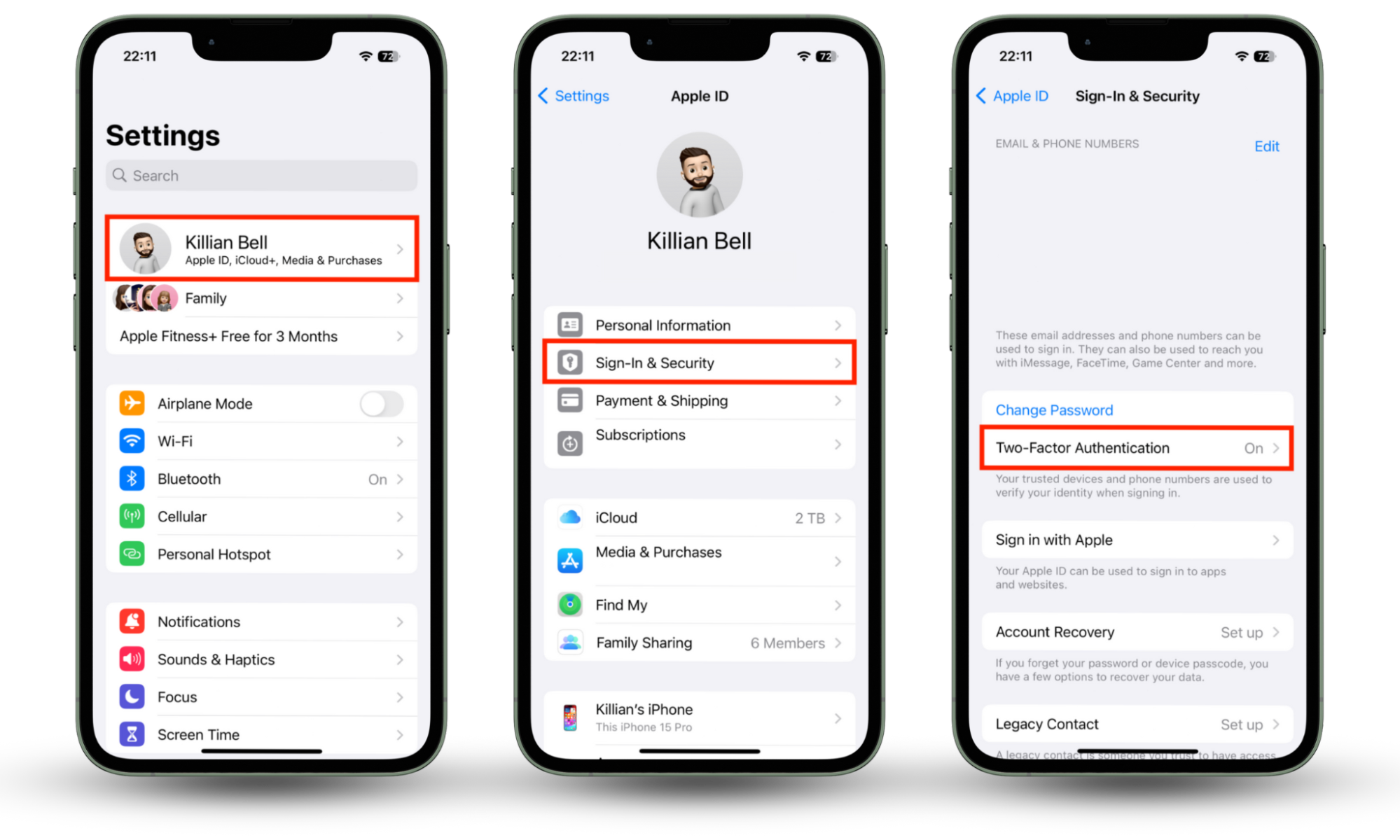
Once 2FA is enabled, you will receive a code by text message whenever you try to log into your Apple ID. This ensures that even if someone obtains your password, they can’t access your account without also having access to your phone to retrieve the 2FA code.
5. Use strong passwords
Using simple and easy-to-guess passwords only makes it easier for hackers to access your accounts. Instead, use strong passwords and avoid using the same password for more than one account.
The best way to generate and securely save strong passwords is with a password manager, and there’s one built into your iPhone. It should automatically ask you if you want to generate a new password whenever you set up an account or change a password. Take advantage of it.
6. Keep your OS up to date
Hackers are always finding new vulnerabilities in iOS that they can exploit to install spyware and other unauthorized apps. The good news is that Apple regularly patches security flaws, so all you need to do is keep your iPhone up to date. Here’s how to install the latest updates on iPhone:
- Open the Settings app on your iPhone, then tap General.
- Select Software Update.
- If a new update is available, you’ll see it here. Tap Install Now to update your iPhone.
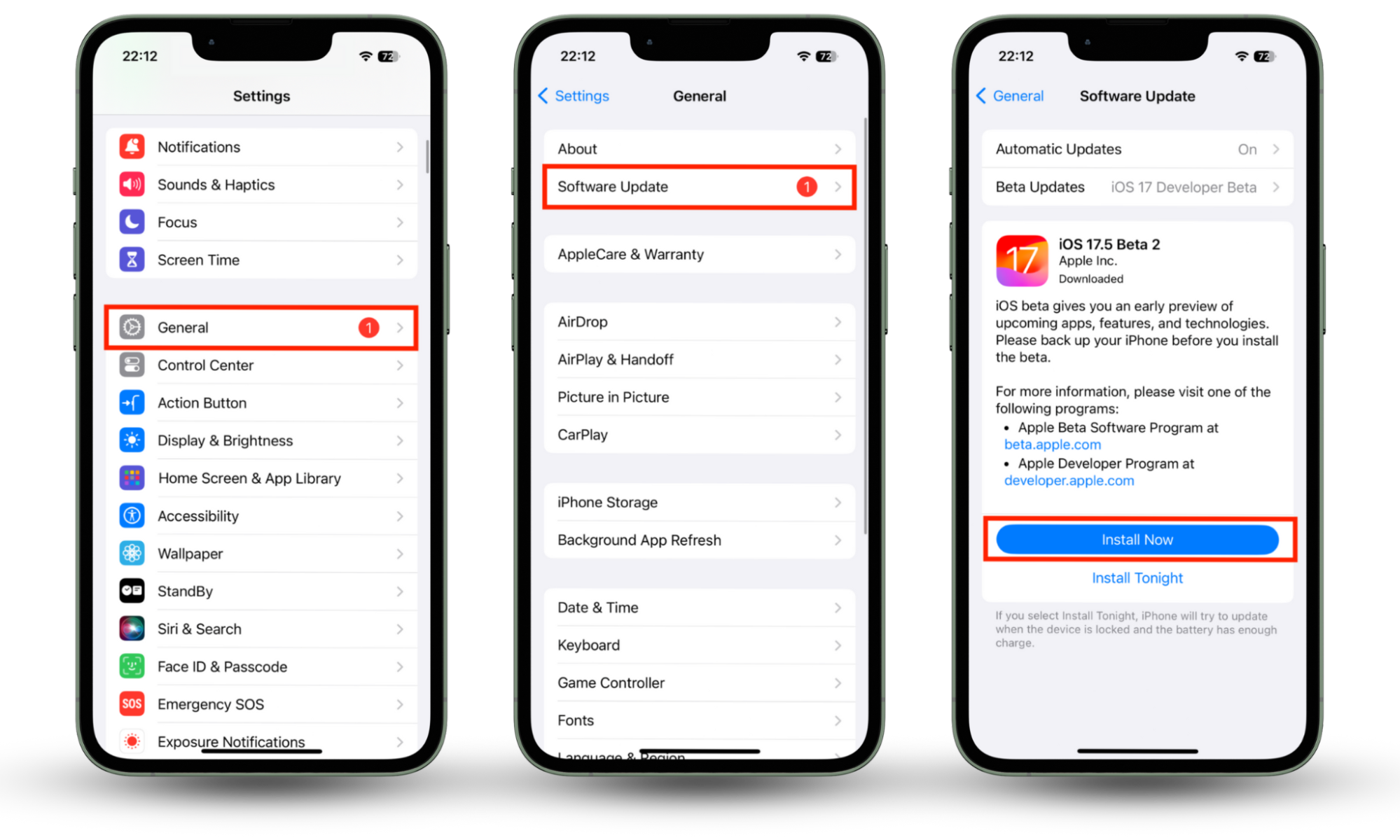
7. Manage app permissions
Every iPhone app needs permission to access many of your device’s features, including its microphone, camera, location, photos, and more. We often grant permissions without checking them or forgetting which permissions we’ve allowed an app access. Here’s how to manage app permissions on iPhone:
- Open the Settings app, then select Privacy & Security.
- Here, you’ll see a list of all iPhone permissions. Tap each one to see which apps have access to it, then use the toggles to enable or disable permissions as you see fit.
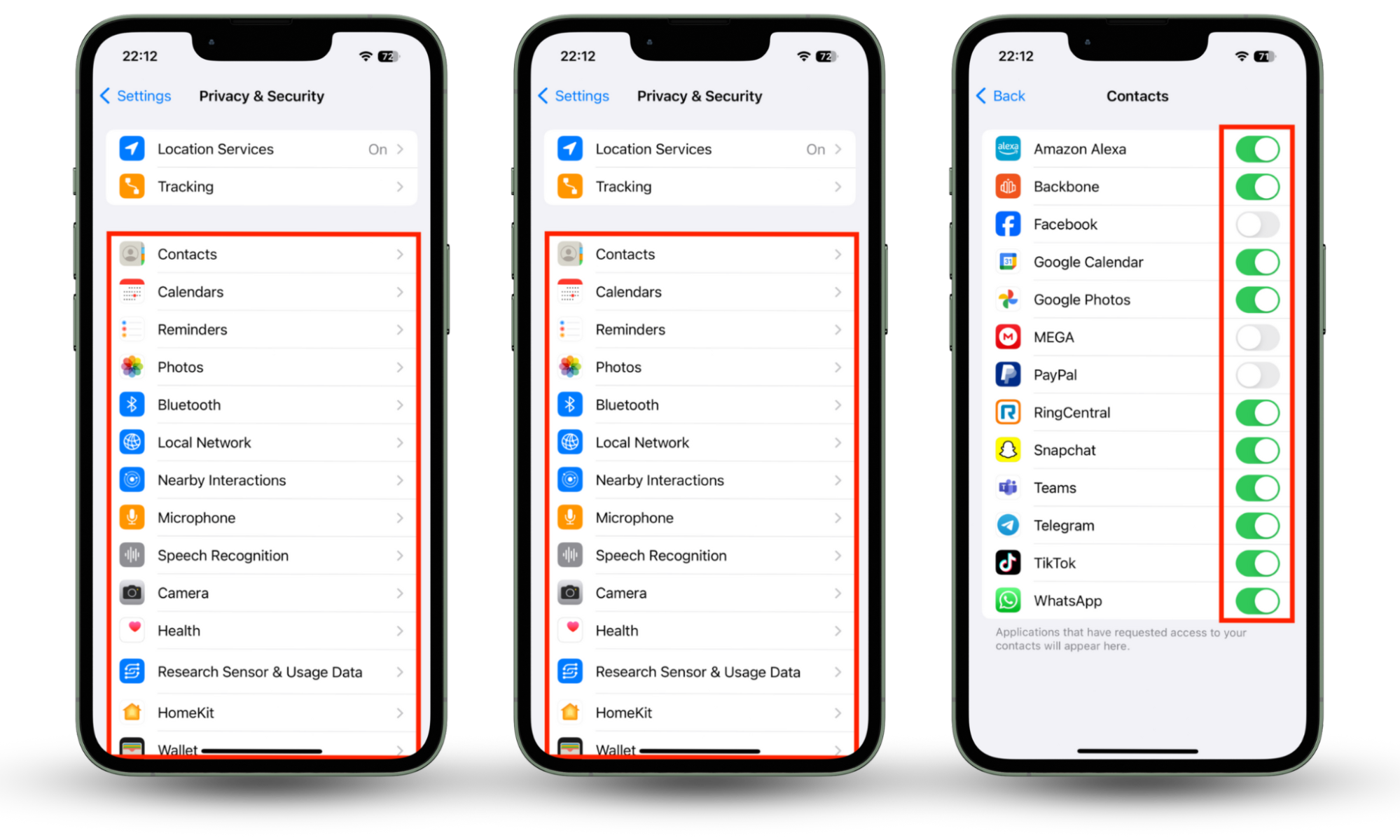
Many iPhone users ask, does the orange dot on iPhone mean someone is listening in? Although that’s not always the case, it does mean that an application is accessing your iPhone’s camera or microphone. Check that the app is genuine, and remove it or change its permissions if you need to.
8. Use anti-spy app
If you’re worried you may miss spyware when looking for it yourself, you can use an anti-spy app to keep you safe instead. Clario Anti Spy not only identifies and removes hidden spyware, but it can also uncover dangerous trackers, find leaked passwords, and hide your real location to protect your privacy.
Attackers go to great lengths to hide their malware, so using a spyware scanner is the best way to find threats that are easy to miss when you’re looking for them manually. If you’re wondering, can someone see you through your phone camera, this is a great way to find out.
What are the legal implications of FaceTime tapping?
In the US and many other countries, it’s illegal to tap into telephone and FaceTime calls. Government and law enforcement agencies can only do this with a court order, which is usually granted when they need to gather intelligence for an investigation or due to national security concerns.
Conclusion
Although it’s possible for spyware to tap into your FaceTime calls, it’s not easy. This kind of software rarely slips through Apple’s net and makes its way onto the App Store, so the only way for attackers to install it is if your device is jailbroken. By following some simple steps, outlined above, the dangers are easily avoidable.
If you suspect someone is using spyware to monitor you, or you think you’re being tracked, you can use Clario Anti Spy to scan your phone to find and stop malicious applications.
FAQ about FaceTime tapping
1. Are FaceTime calls recorded?
No, Apple does not record or store FaceTime calls.
2. Is FaceTime encrypted?
Yes, FaceTime is protected by end-to-end encryption, meaning no one outside of the call—not even Apple—can listen in on them.
3. Can FaceTime calls be traced by police?
Apple anonymizes the FaceTime logs it collects so police cannot trace them. However, with a court order or warrant, the cops may be able to access other communications.
4. Is FaceTime safe for couples?
Yes, FaceTime is very secure due to end-to-end encryption, so it’s perfectly safe for couples.
5. How to know if your FaceTime is hacked
If you’re worried your FaceTime is hacked, there are some signs you should look out for, like suspicious apps on your phone or a jailbreak. Ultimately, you will experience the following if your FaceTime is hacked:
- Weird sounds during calls
- Phone randomly heating up
- Phone screen flickering
- Cyndia app on your iPhone
- Other apps you do not recognize in your App Library, etc.
If you experience at least two of the abovementioned signs, run a spyware scan and a jailbreak detector using Clario Anti Spy immediately. There is a big chance your iPhone may have been hacked.
